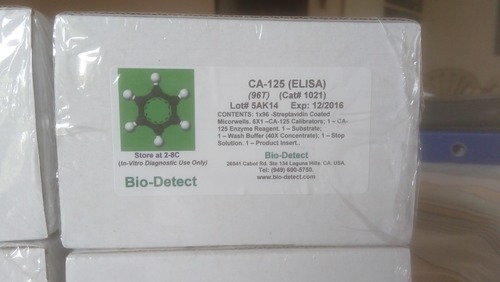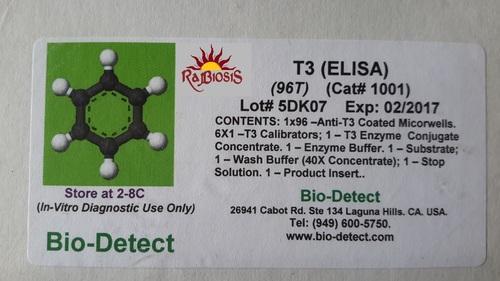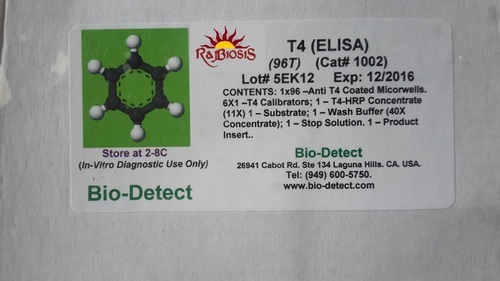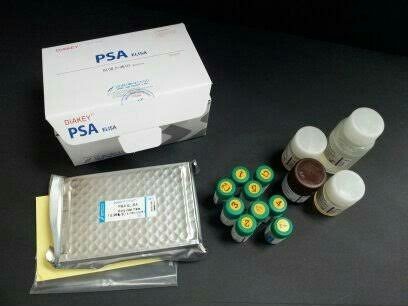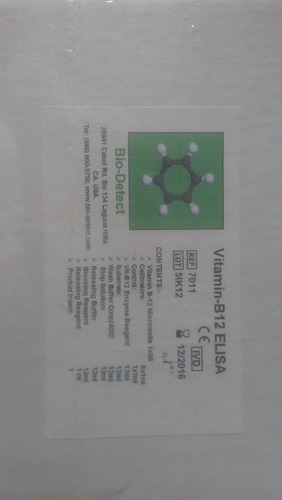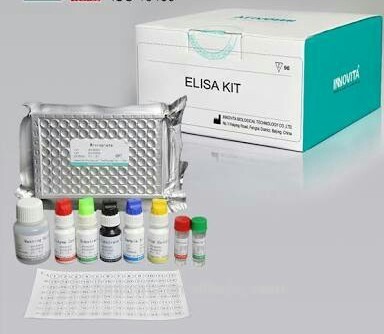Ajmer Jaipur Expressway, Rajasthan
- GST NO. : 08AAECR4942D1ZG
View Mobile Number
rajbiosis@yahoo.in
Elisa Kit
Leading Manufacturers, Exporters, Wholesaler, Retailer and Trader of CA-125 Elisa Kit, Human T3 Hormone Biodetect Elisa Kit, Human T4 Hormone Biodetect Elisa Kit, PSA Elisa Kit, Vitamin B-12 Elisa Kit and Vitamin D Biodetect Elisa Kit from Jaipur.
| Business Type | Manufacturer, Exporter, Supplier, Retailer, Trader, Distributor, Importer |
| Certification | ISO 9001:2008 Certified |
| Feature | East To Operate |
| Packaging Type | Paper Boxes, Plastic Packets |
| Type | Elisa Kits |
| Shelf Life | 12 Months |
| Quantity | 96 Test |
| Assay Time | 0-40 Minutes |
| Country of Origin | India |
| Specificity | 90% |
| Detecting Target | Prolactin |
| Temperature Storage | 2 to 8 Degree C |
Cancer Antigen 125 (CA125) is a surface antigen associated with epithelial ovarian cancer. In serum, CA125 is associated with a high molecular weight glycoprotein. Published studies have indicated that elevated serum CA125 levels can be found in individuals with serious endometroid, clear-cell and undifferentiated ovarian carcinoma. The serum CA125 concentration is greater than 35 units per ml in 60% of women with ovarian cancer and >80% of patients with disseminated ovarian cancer. The serum CA125 is elevated in 1% of normal healthy women, 3% of normal healthy women with benign ovarian diseases, 6% of patients with non-neoplastic conditions (including but not limited to first trimester pregnancy, menstruation, endometriosis, uterine fibrosis, acute salphingitis, hepatic diseases and inflammation of peritoneum, pericardium or pleura). Serial determinations of serum CA125 as well as pelvic examination increase the test specificity. Serum CA125 concentration may be useful in monitoring treatment and distinguishing between good response to treatment and progressive malignant disease with poor therapeutic response.
| Business Type | Manufacturer, Exporter, Supplier, Retailer, Trader, Distributor, Importer |
| Certification | ISO 9001:2008 Certified |
| Shelf Life | 1 Yr |
| Feature | East To Operate, Longer Shelf Life, Washes Flat |
| Quantity | 5x96 Tests |
| Packaging Type | Paper Boxes, Plastic Packets |
| Assay Time | 0-40 Minutes, 40-80 Minutes |
| Specificity | 100% |
| Detecting Target | Prolactin |
| Country of Origin | India |
What Is a T3 Test?
- Your thyroid gland is situated in the neck just below the Adam’s apple. The thyroid creates proteins and controls how your body uses energy and your body’s sensitivity to other hormones. Your thyroid produces triiodothyronine, a hormone known as T3. T3, along with T4 (which is also produced in the thyroid), regulates your body’s temperature, metabolism, and heart rate.
- Most of the T3 in your body binds to protein. The T3 that does not do so is called free T3, and circulates unbound in your blood. The most common kind of T3 test, known as the T3 total test, measures both kinds of T3 in your blood.
- By measuring the T3 in your blood, your doctor may be able to determine if you have a thyroid problem.Why Doctors Perform T3 Tests
Your doctor will typically order a T3 test if he or she suspects a problem with your thyroid. These potential disorders include
- Hyperthyroidism (when your thyroid produces too much thyroid hormone)
- Hypopituitarism (when the pituitary gland doesn’t produce normal amounts of pituitary hormones)
- Primary or secondary hypothyroidism (when the thyroid doesn’t produce normal amounts of thyroid hormones)
- Thyrotoxic periodic paralysis (a disorder that occurs when your thyroid produces high levels of thyroid hormones, which results in muscle weakness)
Your thyroid and the hormones it releases affect much of your body’s function. This means that a thyroid disorder can cause a wide range of symptoms. For example, you might experience mental issues such as anxiety, or physical problems such as constipation and menstrual irregularity.
Other possible symptoms include
- Weakness and fatigue
- Difficulty sleeping
- Increased sensitivity to heat or cold
- Weight loss or gain
- Dry or puffy skin
- Dry, irritated, puffy, and/or bulging eyes
- Hair loss
- Hand tremors
- Increased heart rate
If you already have confirmation of a thyroid problem, your doctor might choose to order this test to see whether there have been any changes in your condition.
Sometimes, your doctor might also order a T4 test and/or a TSH test. T4, or thyroxine, is another hormone produced by your thyroid. TSH (thyroid stimulating hormone) is the hormone that stimulates your thyroid to produce T3 and T4. Testing the levels of either or both of these other hormones can help give your doctor a more complete picture of what’s going on.
Preparing for the T3 Test
Tell your doctor about all of the medications you are currently taking. Some might affect your T3 test results. If your doctor knows about your medications in advance, he or she can advise you to temporarily stop using them or will consider their effect when interpreting your results.
Medications that can affect your T3 levels include, but are not limited to
- Thyroid-related drugs
- Steroids
- Birth control pills and other medications containing hormones such as androgens and estrogens
The T3 Test
- The T3 test simply involves having your blood drawn. The blood will then be tested in a laboratory.
- Your T3 test results will be measured in mcg/dL, which means micrograms per deciliter or nanograms per deciliter. One nanogram [ng] = 0.001 mcrogram [mcg]. Typically, results ranging from 100 to 200 ng/dL are normal.
- A normal T3 test result does not necessarily mean that your thyroid is functioning perfectly. Measuring your T4 and TSH can help your doctor figure out if you have a thyroid problem despite a normal T3 result.
| Business Type | Manufacturer, Exporter, Supplier, Retailer, Trader, Distributor, Importer |
| Brand Name | RajBiosis |
| Method | Lateral Flow Immuno Assay |
| Result Time | 3 min |
| Packaging Type | Box |
| Temperature Storage | 2 to 8 Degree C |
| Model No | T4 (Elisa) |
What Is a T4 Test?
- Your thyroid gland is situated in the neck just below the Adam’s apple. The thyroid creates proteins and controls how your body uses energy and your body’s sensitivity to other hormones. Your thyroid produces triiodothyronine, a hormone known as T3. T3, along with T4 (which is also produced in the thyroid), regulates your body’s temperature, metabolism, and heart rate.
- Most of the T3 in your body binds to protein. The T3 that does not do so is called free T3, and circulates unbound in your blood. The most common kind of T3 test, known as the T3 total test, measures both kinds of T3 in your blood.
- By measuring the T3 in your blood, your doctor may be able to determine if you have a thyroid problem.Why Doctors Perform T3 Tests
Your doctor will typically order a T4 test if he or she suspects a problem with your thyroid. These potential disorders include
- Hyperthyroidism (when your thyroid produces too much thyroid hormone)
- Hypopituitarism (when the pituitary gland doesn’t produce normal amounts of pituitary hormones)
- Primary or secondary hypothyroidism (when the thyroid doesn’t produce normal amounts of thyroid hormones)
- Thyrotoxic periodic paralysis (a disorder that occurs when your thyroid produces high levels of thyroid hormones, which results in muscle weakness)
Your thyroid and the hormones it releases affect much of your body’s function. This means that a thyroid disorder can cause a wide range of symptoms. For example, you might experience mental issues such as anxiety, or physical problems such as constipation and menstrual irregularity.
Other possible symptoms include
- Weakness and fatigue
- Difficulty sleeping
- Increased sensitivity to heat or cold
- Weight loss or gain
- Dry or puffy skin
- Dry, irritated, puffy, and/or bulging eyes
- Hair loss
- Hand tremors
- Increased heart rate
If you already have confirmation of a thyroid problem, your doctor might choose to order this test to see whether there have been any changes in your condition.
Sometimes, your doctor might also order a T4 test and/or a TSH test. T4, or thyroxine, is another hormone produced by your thyroid. TSH (thyroid stimulating hormone) is the hormone that stimulates your thyroid to produce T3 and T4. Testing the levels of either or both of these other hormones can help give your doctor a more complete picture of what’s going on.
Preparing for the T4 Test
Tell your doctor about all of the medications you are currently taking. Some might affect your T3 test results. If your doctor knows about your medications in advance, he or she can advise you to temporarily stop using them or will consider their effect when interpreting your results.
Medications that can affect your T4 levels include, but are not limited to
- Thyroid-related drugs
- Steroids
- Birth control pills and other medications containing hormones such as androgens and estrogens
The T4 Test
- The T3 test simply involves having your blood drawn. The blood will then be tested in a laboratory.
- Your T3 test results will be measured in mcg/dL, which means micrograms per deciliter or nanograms per deciliter. One nanogram [ng] = 0.001 mcrogram [mcg]. Typically, results ranging from 100 to 200 ng/dL are normal.
- A normal T3 test result does not necessarily mean that your thyroid is functioning perfectly. Measuring your T4 and TSH can help your doctor figure out if you have a thyroid problem despite a normal T3 result.
| Business Type | Manufacturer, Exporter, Supplier, Retailer, Trader, Distributor, Importer |
| Certification | ISO 9001:2008 Certified |
| Feature | East To Operate, Longer Shelf Life, Washes Flat |
| Packaging Type | Paper Boxes, Plastic Packets |
| Shelf Life | 1 Yr |
| Quantity | 5x96 Tests |
| Assay Time | 0-40 Minutes |
| Country of Origin | India |
| Specificity | 100% |
ELISA kits are commonly used to measure soluble biomarkers across a variety of research areas. ELISA kits for Human PSA can be quantified in various samples, including plasma, serum, supernatant.
Invitrogen ELISA kits exist in two formats: Uncoated and Coated. Uncoated ELISA kits include all the necessary reagents to coat your own plates and run your assay with maximum flexibility. Coated ELISA kits are ready-to-use and quality tested for sensitivity, specificity, precision and lot-to-lot consistency.
| Business Type | Manufacturer, Exporter, Supplier, Retailer, Trader, Distributor, Importer |
| Certification | ISO 9001:2008 Certified |
| Feature | East To Operate |
| Packaging Type | Plastic Bottle,Plastic Pouch |
| Type | Elisa Kits |
| Shelf Life | 12 Months |
| Quantity | 96 Test |
| Assay Time | 0-40 Minutes |
| Country of Origin | India |
| Specificity | 90% |
The B12 test kit is a solid phase enzyme-linked immunoassay (ELISA), based on the principal of delayed competitive binding. Streptavidin coated wells are incubated with extracted Vitamin B12 standards, controls, samples, and Intrinsic Factor-Biotin conjugate at room temperature for 45 minutes. During the incubation, the biotin-labeled intrinsic factor will bind to the Vitamin B12 in the sample, standard, or quality control serum. After the 45 minute incubation, Vitamin B12-Enzyme conjugate is added which competes with the Vitamin B12 of the sample, standard, or quality control serum for remaining sites on the Intrinsic Factor for an additional 30 minutes. All unbound conjugates are then removed and the wells are washed. Next, a solution of TMB Reagent is added and incubated at room temperature for 15 minutes, resulting in the development of blue color. The color development is stopped with the addition of stop solution, and the absorbance is measured spectrophotometrically at 450 nm
| Business Type | Manufacturer, Exporter, Supplier, Retailer, Trader, Distributor, Importer |
| Shelf Life | 12 Months |
| Packaging Type | Box |
| Usage/Application | Hospital |
| Form | Tablet |
| Method | Elisa |
| Packaging Size | 50 Tablet |
| Material | Plastic |
What is Vitamin D?
- Vitamin D, often called the “sunshine vitamin,” is an important nutrient. Its active form, called calcitriol, behaves like a hormone in the body. The body can produce 10,000 IU or more of vitamin D with little as 10 to 15 minutes of exposure to summer sunlight.
- Vitamin D plays a crucial role in supporting and maintaining bone health. There are few natural food sources that contain vitamin D. Food manufacturers began fortifying milk and other products with vitamin D decades ago, aimed to wipe out rickets, a childhood bone disease.
- Receptors for this important hormone are found in virtually every type of cell and tissue in the body. Receptors work like locks: the lock turns when the right key is inserted, prompting the cell to act in a certain way. Evidence shows that people with higher levels of vitamin D may live longer. Studies also suggest that a majority of Americans have insufficient or deficient levels of vitamin D.
Why Do You Need Vitamin D?
- The presence of vitamin D receptors throughout the body hints at the importance of the vitamin. Research shows that vitamin D plays a crucial role in the health of the immune system, brain, heart and blood vessels, among other organs and systems.
- Many doctors now monitor their patients’ vitamin D levels and prescribe supplemental vitamin D when levels are too low. A lack of vitamin D may increase your risk of developing numerous diseases and conditions.
- Autoimmune diseases—such as type 1 diabetes, multiple sclerosis, and rheumatoid arthritis—may be linked to a vitamin D deficiency. Autoimmune diseases occur when the immune system attacks the body’s own tissues. Too little vitamin D has been linked to poor immune system function.
- Vitamin D deficiency is also linked to a risk for type 2 diabetes, osteoporosis (a condition that results in brittle bones), heart disease, mood disorders, and even certain types of cancer. The active form of vitamin D helps control chronic inflammation. Ongoing inflammation has been linked to diseases such as hardening of the arteries (atherosclerosis), arthritis (painful, inflamed joints), and even cancer.
Supplementation Recommendations
- Vitamin D may be taken as a supplement. Two forms are available: vitamin D3 and vitamin D2. Vitamin D3 is preferable, as it is better absorbed when taken by mouth.
- Current government recommended dietary allowances for vitamin D range from 400 IU to 800 IU daily. Many experts argue that higher daily intakes than what’s recommended are required to achieve better health outcomes. Some experts even recommend taking 2,000 to 7,000 IU of vitamin D3 everyday.
Vitamin D Deficiency
The following factors can affect your vitamin D levels:
- Exposure to sunlight
- The use of sunscreens
- Body mass
- Skin color
- Diet
- People with dark skin don’t make vitamin D as easily as light-skinned people when exposed to sunlight.
Vitamin D dissolves in fat, and is stored in fat cells. Overweight people tend to have more vitamin D stored in fat rather than circulating in the blood. They may require higher doses of vitamin D3 to maintain optimal serum levels.


